EICAA
Latest EICAA News
Openness to new ideas and the right entrepreneurial actions are more important than ever in today’s business world. Entrepreneurship Education (EE) provides the foundation for creative and innovative thinking and equips the entrepreneurs of the future with the necessary skills and knowledge to develop themselves and their work further. Entrepreneurship is not only limited to economic actions, but also encompasses a set of soft and cross-cutting skills that are required in today’s business world. For this very reason, it is imperative to know which elements are already in place and which need to be fostered or even learned.
We invite you to read the first issue of our electronic magazine, which highlights entrepreneurship education at our partner universities and the developments of the project.
Find the EICAA E-Zine here.
On the 2nd and 3rd of February, the second transnational partner meeting of the Erasmus+ funded EU project EICAA took place as a hybrid meeting in Antwerp. Besides constructive discussions on various milestones, those present on site could enjoy the charm of the city of Antwerp.
After two transnational partner meetings held online, Antwerp Management School welcomed the EICAA consortium to its first hybrid meeting in Antwerp, Belgium in early February. The two-day meeting of the Knowlede Alliance, established under Erasmus+, contributed to a closer connection between all EICAA core collaborators and thus to the progress of EICAA itself.
On the first day, after a status update and an outlook on the rest of 2022, the focus was on Work Packages (WP) 2 and 3. WP2 is about the conceptual framework of EICAA while within WP3 the rubric system methodology and monitoring instrument for competence assessment will be developed. So in the beginning, the main outcomes of WP2 were highlighted and the structural representation and visualization of the framework were discussed, as well as further inputs were collected from all partners. In the second part of the day, the partners dealt with WP3 and the next steps for the rubric and survey.
The productive and successful day ended with a guided city tour followed by a Belgium beer tasting.
On the second day, the planning and structuring for WP4 (EICAA – Intervention Repository) and WP5 (EICAA – Digital Platform) took place. The focus was on the transition from each work package to the following ones. In addition, dissemination partners presented insights on ongoing dissemination and provided information on other relevant activities (conferences, workshops, etc.). The next physical meeting is planned for May 2022 in Innsbruck.
All in all, it was a successful third EICAA Partner Meeting and an important milestone for the further development of the EICAA project.
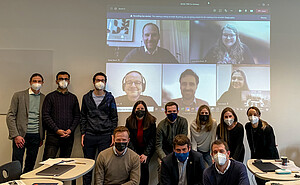
For most people, inspiration is what keeps them going. Inspiration for life, for work, or for getting the best out of themselves. It can be extremely frustrating to lose inspiration or never find it – so what can we do to get inspired and stay inspired?
Inspiration starts with a positive attitude. Seeing the glass half-full makes life easier, but what if that is not possible? Bad things happen and that is completely normal, but getting out of the vicious circle of bad feelings and destructive thinking can be difficult. Entrepreneurship doesn’t need positive or happy people – rather individuals that see every hurdle as an opportunity. Literature suggests that inspiration enhances entrepreneurial capabilities and therefore positively influences their outcomes and reduces cognitive biases (Baron, 2008, 2014; Thrash & Elliot, 2003).
Every setback or problem can be the reason for inspiration. If something doesn’t work out – try again. Your problem might be someone else’s too. Inspiration is a motivational aspect for entrepreneurs. Your own problem should provide some sort of inspiration. Inspiration for learning or inspiration to actively change something. Your lived experience will maximize the impact of your solution – for you and your community (Papi-Thornton, 2016).
Talk to peers to find answers to unanswered questions and ask for their inspiration. Second opinions can always be useful, and a new perspective may bring a new form of inspiration. Share your ideas and also get in touch with others in the field. Their experience may help you, or at least inspire you.
For a fresh start, get outside and take a break. Life goes on, even without inspiration. Look at other things in nature and let your mind wander. Ideas will keep coming – creativity and inspiration take time to grow. Entrepreneurs often adopt the “inside view”, an internal, unique viewpoint that ignores external information (Wartiovaara et al. 2019). Be patient, listen to music, read a book, or change your routine. Habits may be good, but limit us to a certain way of doing things. Inspiration requires openness and often stepping out of your comfort zone.
References:
Baron, R. A. (2008). The role of affect in the entrepreneurial process. Academy of Management Review, 33(2), 328–340.
Baron, R. A. (2014). Essentials of entrepreneurship: Evidence and practice. Cheltenham, UK: Edward Elgar Publishing.
Papi-Thornton, D. (2016). Tackling Heropreneurship - An “apprenticing with a problem” approach to move us from the social entrepreneur to social impact. issuu.com/tacklingheropreneurship/docs/tackling-heropreneurship-daniela-pa_a71e249ce19e57
Thrash, T. M., & Elliot, A. J. (2003). Inspiration as a psychological construct. Journal of Personality and Social Psychology, 84(4), 871.
Wartiovaara, M., Lahti, T., & Wincent, J. (2019). The role of inspiration in entrepreneurship: Theory and the future research agenda. Journal of Business Research, 101, 548-554.
Find the full blog post on: https://www.eicaa.eu/entrepreneurial-mindset-how-do-you-get-inspired-university-of-hohenheim/
The EICAA partners were happy to meet again on May 18th and 19th for the fourth transnational partner meeting of the Erasmus+ funded EU project Entrepreneurial and Intrapreneurial Assessment Alliance (EICAA), which took place in hybrid form in Innsbruck. Not only the project progress and further development were worked on, but also the most beautiful facets of Innsbruck were explored.
After a successful partner meeting in Antwerp the Management Center Innsbruck and ProMedia Kommunikation Innsbruck welcomed representatives of all EICAA partners from five different EU countries to the fourth transnational partner meeting in Innsbruck, Austria in May. The two-day meeting was characterized by exciting discussions and agreements for further steps in the EICAA project, which is developing a digital platform to improve entrepreneurial skills. The focus was on the assessment tool that will analyze the entrepreneurial competences of platform users. In the meantime, the prototype of the platform has been developed and work is underway to collect methods that will contribute significantly to the improvement of entrepreneurial skills.
As a reward for the successful work during the days, the EICAA Consortium ended the afternoon with a walk to the Hungerburg. As a highlight, the unique view of the city and the surrounding mountains could be enjoyed. Afterwards it went to the common dinner, where the day could be reviewed once again.
Now, the project is about building bridges between the individual work packages and linking the individual outputs with each other. The common exchange with our partners from Austria, Hungary, Germany, Spain, and Belgium provided great motivation and the whole EICAA consortium is looking forward to the next partner meetings.
The second issue of the EICAA electronic magazine (E-Zine) focuses on entrepreneurial and intrapreneurial dynamics inside the EICAA consortium. Each one of the nine partners (five university and four corporate partners) gives insights and information on how they handle different environmental, social, economic or other business-related issues and circumstances. The magazine also features the latest updates and milestones of the project. Furthermore, readers learn more about how they can become part of the EICAA community and participate in the EICAA pilot round. Enjoy your reading!
Our EICAA consortium met on October 19th and 20th for the fifth transnational partner meeting of the Erasmus+ funded EU project Entrepreneurial and Intrapreneurial Assessment Alliance (EICAA) – this time in Halle (Saale), Germany. The combination of hard work with major developments and fun group activities made it a successful reunion for our EICAA project team.
After the last meeting in Innsbruck, it was now Univations’ turn to host the fifth transnational partner meeting. Our EICAA consortium travelled from five different EU countries to develop and discuss further steps around the EICAA project in Halle (Saale) in October. During the productive two-day meeting many new ideas, decisions and solutions were made to develop the project further. One of the main topics was the EICAA Digital Platform, which is already in advanced stages and now being further optimized step by step. The focus was also put on the upcoming EICAA pilot round. By outlining the desired outputs, the EICAA consortium set the course for the implementation which will be another big milestone in the project.
In addition to the hard and productive work on the progress of the project, our members of the EICAA consortium were entertained with a guided tour through the historical old town of Halle, Saale. The team enjoyed their evenings with joint dinners letting the productive days come to a relaxed end.
It is always a great pleasure to see how nine partners from five different EU countries bundle their resources to bring the EICAA project to success. All partners of the EICAA consortium are already looking forward to the next partner meeting in Szeged, Hungary.
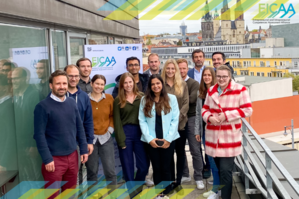
“Online Support for Education in Entrepreneurial and Intrapreneurial Competencies: A Proposal for an Assessment Tool and Support for Tailor-Made Training” is the title of the paper written by our partners and presented at the Open International Conference in Paris. The main focus of the article is on the basic structure and functions of the EICAA digital platform.
The aim of EICAA – Entrepreneurial and Intrapreneurial Competences Assessment Alliance and the digital platform within the project is to support lectures, coaches, human resource specialists and managers to assess and improve the entrepreneurial competences of students and employees. A lot of theoretical and conceptual work was necessary for the foundation of this platform. Some of these results as well as some deeper insights regarding the digital platform are now presented in a paper published in the journal Education Science.
Special thanks for the effort and the outcome goes to Ester Bernadó and Jaume Teodoro from Tecnocampus, Anita Zehrer from Management Center Innsbruck, Wouter Van Bockhaven from Antwerp Management School and EICAA project coordinator Florian Bratzke from Univations.
With this publication, another small, but important step for the success of EICAA has been achieved. In the coming months, the EICAA platform will be piloted at various universities and companies in Europe.
The whole article can be accessed here.
In her research, Louisa Mach (University of Hohenheim) investigates how innovation and entrepreneurship related competences are captured and taught in staff training and education programs.
Lifelong learning (LLL) is a European initiative for fostering learning throughout the life of an individual. Before LLL became a “cradle-to-grave approach” (Volles, 2016, p. 344), learning initiatives concentrated on secondary education. By introducing a holistic approach to education, the EU integrates all education levels and education institutions. Learning refers to more than education alone – education is seen as a standardized process conducted by formal institutions, whereas learning is rather informal and can be undertaken at any point in life (Borg & Mayo, 2005; European Parliament & the Council of Europe, 2006). In 2018, the European Commission published the most recent update on key competences for LLL. The competences include literacy, multilingual competence, mathematical and scientific competence, digital competence, personal competence, citizen competence, cultural awareness, and entrepreneurship competence. Entrepreneurship competence comprises acting upon ideas and opportunities and transforming them into value for others (European Commission, 2019).
While learning during primary and secondary education is widely researched. Innovation and entrepreneurship competences have not been analyzed in the context of adult further education and training. Although, adult education integrates the principles of lifelong learning to add value to the social, cultural, and economic development of society as a whole (Sanchez et al., 2008), adult education in further staff training has not yet attracted widespread attention of researchers.
Louisa Mach sets out to address this gap by analyzing how innovation and entrepreneurship competences are captured and taught in staff training and further education.
Louisa Mach analyzes 72 further education programs in the state of Baden-Württemberg. She employs thematic analysis and competence mapping to identify important competences for staff training in the innovation context.
The sample focuses on lower-level learning goals and cooperative teaching methods for adult learning. Training offerings incorporate different competences into their programs, with a predominant focus on the competence area ‘Ideas and Opportunities’. Analysis of the underlying competence threads suggests a stronger teaching focus on creative and collaborative competences than theoretical or personal competences, knowledge, and skills. In addition, the sample implies that further staff training relies more on traditional teaching styles with trainer-centric learning settings.
Problem-based learning as well as mixed knowledge and mixed skill-based assessment can make it easier to achieve the holistic set of competencies required for entrepreneurship and innovation. Furthermore, Louisa Mach’s research shows that adult education is less focused on competences that integrate attitude domains, as adults’ attitudes toward innovation and entrepreneurship are already shaped. Leadership development, in particular, fosters an environment conducive to innovation and an organizational learning culture.
Although this sample only presents a small set of education programs, the underlying competence structure and teaching styles add to our knowledge of adult education. Organizational learning and transformational leadership create a better climate for fostering a holistic set of entrepreneurial and innovation competences. Moreover, further education increases lifelong learning for older members of the workforce and creates equality among learners. In order to fight the arising skill gap throughout Europe, adult education is an important cornerstone for competence development to foster innovation in EU member countries (European Commission, 2017).
Author: Louisa Mach, University of Hohenheim
References:
Borg, C., & Mayo, P. (2005). The EU Memorandum on lifelong learning. Old wine in new bottles?. Globalisation, Societies and Education, 3(2), 203–225. doi.org/10.1080/14767720500167082
European Commission. (2016). A new skills agenda for Europe (COM/2016/0381 final). eur-lex.europa.eu/legal-content/EN/TXT/
European Commission. (2017). A renewed EU agenda for higher education. In Official Journal of the European Union ISSN. eur-lex.europa.eu/legal-content/EN/TXT/PDF/
European Commission. (2019). Key competences for lifelong learning. doi.org/10.2766/291008
European Parliament, & Council of Europe. (2006). Action Programme in the Field of Lifelong Learning (2004–2006). Official Journal of the European Union, 327, 45–68.
Sanchez, A. V., Ruiz, M. P., Olalla, A. G., Mora, G. M., Paredes, J. A. M., Otero, J. M., San Ildefonso, M. I., & Eizaguirre, J. S. (2008). Competence-based learning. www.deusto-publicaciones.es/ud/openaccess/tuning/pdfs_tuning/tuning13.pdf
Volles, N. (2016). Lifelong learning in the EU: changing conceptualisations, actors, and policies. Studies in Higher Education, 41(2), 343–363. doi.org/10.1080/03075079.2014.927852
Find the full blog post here.
EICAA partners from five countries travelled to Szeged, Hungary for our sixth transnational partner meeting of the Erasmus+ funded EU project “Entrepreneurial and Intrapreneurial Assessment Alliance (EICAA)”. This time the focus was on further development of the EICAA Digital Platform as well as constructive discussions about the pilot round. The combination of focused work, progress on the strategic path ahead and exciting group activities were the outcome of a successful sixth meeting.
This time it was the turn of University of Szeged to host the latest transnational partner meeting. During the productive two-day meeting, with many constructive discussions, further development of the next strategic and operational steps around the whole EICAA project and far-reaching decisions, the main focus was on questions about the pilot round and the road to finalization of the EICAA Digital Platform. Of course, there was also time to review the status quo of the entire project and provide a future outlook on the next steps.
Besides the hard work on the progress of the project our consortium had the chance to get to know the city better during a guided city tour after dark. In addition to the cultural insights – the EICAA team ended the evenings with a delicious Hungarian dinners and nice conversations, during which the working day could be reviewed once again.
It is a great pleasure for everyone involved to see how all partners from nine nations combine their expertise to jointly pursue the goal of developing a digital platform for the assessment and improvement entrepreneurial and intrapreneurial competences. The whole EICAA consortium is already looking forward to the next sunny meeting in Spain in June. A big thanks goes to the University of Szeged for the great organization of the meeting.
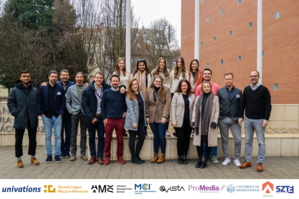
The third issue of the EICAA electronic magazine (E-Zine) focuses on the benefits and challenges of working on EICAA.
The four corporate partners give insights and information on the valuable experiences, professional and personal growth as well as tasks that demanded a lot from them. The magazine features the latest updates and milestones of the project. EICAA was also presented across the EU in various conferences which can be looked up in this issue. Furthermore, readers learn more about how they can become part of the EICAA community and participate in the EICAA pilot round.
Enjoy your reading!
It was time for our seventh official transnational partner meeting of the Erasmus+ funded EU project “Entrepreneurial and Intrapreneurial Assessment Alliance (EICAA).” From June 14th to 15th, all partners of the EICAA consortium took part in the meeting in Mataró to discuss the final necessary steps to complete our project. Besides discussions on the current status and reaching the final milestones, the focus was on the EICAA Pilot Round and sustaining the EICAA project. Productive working days were concluded with enjoyable group activities and joint dinners.
Mataró was the place to be for our seventh official transnational partner meeting, hosted by TecnoCampus. Our two-day productive meeting was marked by several highlights regarding the finalization of the EICAA project. Furthermore, we made many constructive decisions regarding the next strategic and operational steps. The main priorities of the meeting were determining the further procedures for the EICAA Pilot Round and establishing plans on how the EICAA project will be sustain.
To conclude the workdays with an enjoyable evening program, the EICAA consortium was given a guided tour through Mataró and had the opportunity to review the progress made over a joint dinner.
What is next?
EICAA will be attending the EAIR Forum in Linz from September 3rd to 6th, where we will present the final version of the EICAA Digital Platform. Additionally, the project will also be part of the “Being Entrepreneurial” conference on November 7th, 2023.
Once again, it was a great pleasure for all partners to continue working on this joint project and to exchange ideas with other experts in the field. The entire consortium is looking forward to meeting again at the EAIR Forum in Linz. A big thanks goes to TecnoCampus for the excellent organization of the meeting.
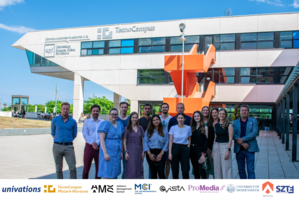
The fourth edition of the EICAA electronic magazine (E-Zine) centers around the implementation process of the EICAA Pilot Round. Our five esteemed university partners provide valuable insights into the round’s experiences, results, and overall outcomes. Alongside their accounts, we have included captivating articles about our recent conference visits and workshops related to the project as a whole. We also take a moment to reflect on our last transnational partner meeting held in Mataró, Spain and provide updates on upcoming milestones as we progress towards the completion of the EICAA project.
The Entrepreneurial and Intrapreneurial Competences Assessment Alliance (EICAA) made a significant mark at the EAIR Forum 2023 held in Linz, Austria from September 3rd through 6th. This gathering of educators and researchers witnessed the EICAA Consortium’s active participation, which included a series of remarkable contributions.
A standout moment for the EICAA project during the event was the workshop on the EICAA Digital Platform led by core staff member Ester Bernadó from TecnoCampus. After almost three years of relentless dedication, the consortium unveiled the EICAA Digital Platform during this prestigious event. The workshop served as a platform to introduce the core ideas, achievements, and the immense potential of the digital platform to educators and researchers alike. It encouraged meaningful exchanges, inspired attendees, and garnered valuable feedback for further enhancements.
In addition to the workshop, several other sessions featured noteworthy presentations from EICAA partners. Louisa Mach from the University of Hohenheim shared insights on “Competences for a Great Big Beautiful Tomorrow? Innovation, Sustainability, and Responsibility in Further Education.” Meanwhile, Tanvi Anand from Antwerp Management School, along with Ester Bernadó and Marta Carceller Aragall from TecnoCampus, presented the “Validated Taxonomy of Entrepreneurial Competences.” Furthermore, Prof. Dr. Anita Zehrer and Christine Pirhofer from MCI | The Entrepreneurial School® hosted a session titled “Putting EICAA into Practice – Speed Dating with Family Firm Entrepreneurs to Foster Enterprising Literacy in Entrepreneurship Education.”
The EICAA Consortium’s active involvement and insightful contributions at the EAIR Forum 2023 underscored their commitment to advancing entrepreneurial and intrapreneurial competences in education and research. This event marked a pivotal moment in their journey, showcasing the fruits of their labor and setting the stage for continued innovation in the field.
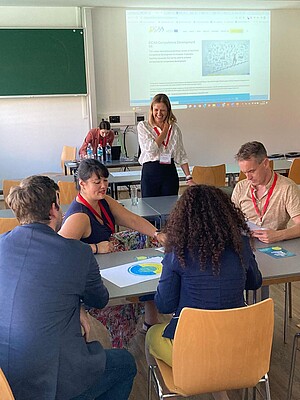
The 10th RMER Conference was hosted by ISCTE Business School in Lisbon, Portugal, from September 26th to 28th. This year’s conference was held under the motto of “Sustainable and Responsible Management: A Decade of Integrating Knowledge and Creating Societal Impact through Innovation and Entrepreneurship.”
Over the course of ten years, RMER Conferences have delved into the intricacies and global issues associated with shifting towards more sustainable methods of production and consumption. Various stakeholders, including businesses, non-profits, governmental entities, institutions, individuals, and society, must collaborate harmoniously to effectively advance the 2030 Agenda and beyond. Through diverse and interdisciplinary discussions and the exchange of knowledge involving management educators and various other stakeholders, progress has been made in promoting responsible management education and learning. While the challenge persists, further conversations are necessary to address how economic restructuring and social transformation are essential on the path to a more sustainable world.
Louisa Mach from the University of Hohenheim presented her research on competence-based learning as part of the EICAA consortium. Building on the competence-mapping approach, her research delves into sustainability-related competences in innovation management for further education as part of the European lifelong learning initiative. Despite extensive research in primary and secondary education, adult education often remains overlooked. Competence-based learning serves as a favored approach to integrating knowledge, skills, and attitudes across various domains. Through thematic analysis and deductive coding, the study examines 72 innovation management-related further education programs conducted in Baden-Württemberg, Germany, between June and December 2022. The findings unequivocally demonstrate the inclusion of sustainability competences in innovation-related further education. Notably, Strategic Competence emerges as the most prevalent, while Normative Competence appears least frequently. This research significantly advances the convergence of further education in innovation management, responsible management education, and competence-based learning, emphasizing the importance of sustainability competences in adult learning contexts. By shedding light on this underexplored domain, the study prompts further exploration and development of sustainable educational practices for lifelong learning.
Other contributions from the conference also focus on competence-based teaching and learning to foster transversal skills necessary for achieving the targets of the 2030 Agenda. Moreover, the conference served as a small EICAA reunion with colleagues from MCI, which is always a pleasure.
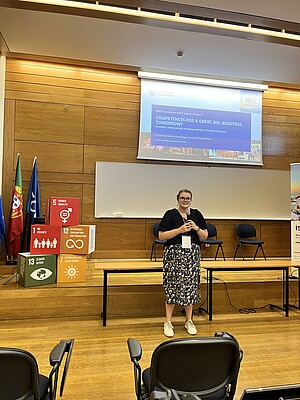
The recent return to Antwerp, Belgium marked the culmination of collaborative efforts as international partners gathered for a final transnational meeting at the Antwerp Management School.
This meeting became a pivotal juncture where crucial aspects of the project were meticulously discussed and refined. Foremost among the agenda items was the EICAA Digital Platform, which had reached an advanced stage. Deliberations revolved around minor tweaks necessary for implementation before the project’s conclusion. An intriguing aspect was the usability eye-tracking study conducted by Adsata, adding valuable insights into enhancing user experience.
The meeting also centered on evaluating the Pilot Round results and outlining their utilization in crafting a comprehensive handbook along with detailed data analysis. Simultaneously, the focus extended to disseminating final outputs, including the creation of an engaging E-Zine and website modifications geared towards heightened user-friendliness. Quality Assurance stood as a paramount focus in the project’s concluding stages and the partners also discussed the sustainability of EICAA beyond 2023, ensuring its continuity and relevance.
Despite the intensive work sessions, partners seized the opportunity to immerse themselves in Antwerp’s rich history. Explorations into the city’s past unveiled intriguing narratives about the old stock exchange, the etymology behind Antwerp’s name, and the tale of “Nello and Patrasche”. Post-meeting, the partners actively participated in the Being Entrepreneurial 2023 conference. Their involvement included holding a workshop aimed at bridging EICAA with entrepreneurs and educators, fostering greater awareness and engagement within the entrepreneurial community.
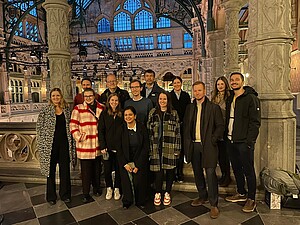
The fifth edition of the EICAA electronic magazine (E-Zine) centers around celebrating three years of the EICAA project. All esteemed partners provide valuable insights into work done throughout the years, that led to the EICAA Digital Platform. Alongside their accounts, we have included captivating articles about our recent conference visits and workshops related to the project as a whole. We also take a moment to reflect on our last transnational partner meeting held in Antwerp, Belgium.
